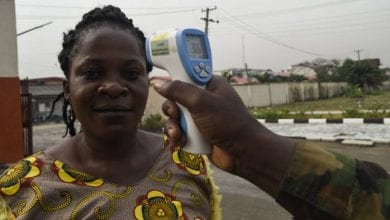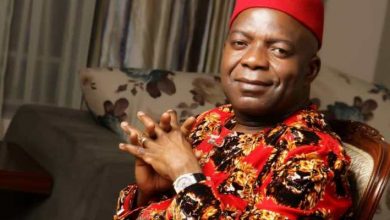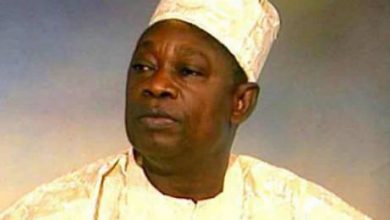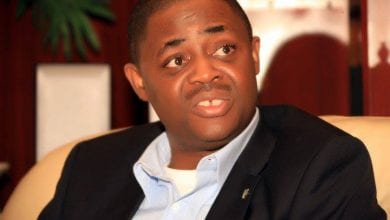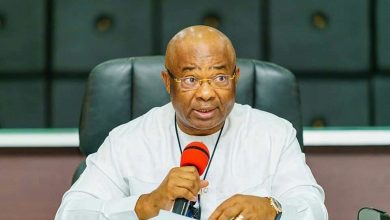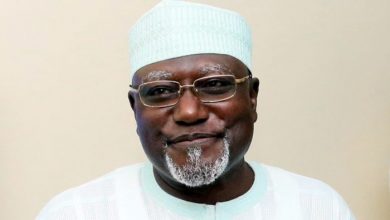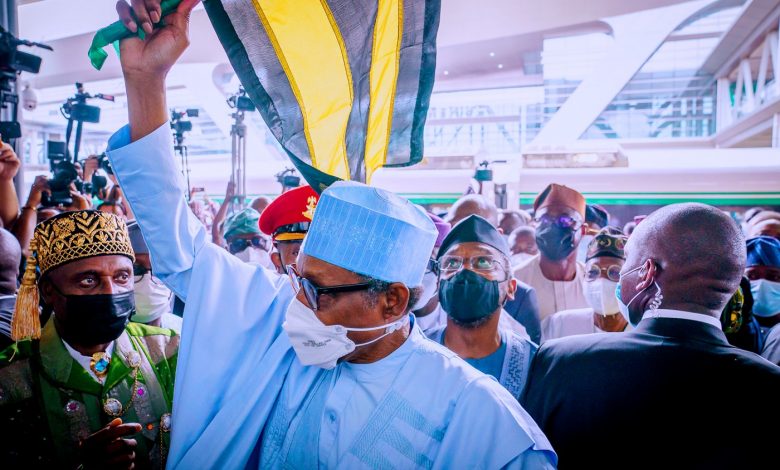
Today, at the weekly #StateHouseBriefing, we hosted the Minister of Transportation, Chibuike Rotimi Amaechi, to talk about the Buhari Administration’s Rail Program.
Here’s what you need to know:
Nigeria’s Rail Modernisation Program as we know it started with the Obasanjo Administration. In 2002, the Administration announced a 25-year plan to, as the BBC put it, “modernise and expand its ageing railway network.” As far as we can tell, however, that Administration did not lay a single new kilometer of standard gauge rail, in its 8 years in office. All it did was to lay out a vision. It awarded some contracts towards the end of its tenure, but no work was ever done — at least not on Standard Gauge Rail.
The Yar’Adua/Jonathan administration that followed went ahead to start implementing the Program, kicking-off construction work on the Abuja Light Rail (Abuja Metro) c2010, and on the Abuja — Kaduna Standard Gauge Rail Line c2011. Unfortunately it was unable to complete either by the time its tenure ended in May 2015.
It has therefore fallen upon President Buhari to complete these projects, and initiate new ones — the first administration in recent Nigerian history to commission completed Rail Projects. There is no doubt whatsoever that President Buhari has done far more than any administration in post-Independence Nigeria to develop a modern rail system for the country.
First things first:
In terms of completing the rail projects inherited from the preceding Administration, the Abuja-Kaduna Rail was completed and commissioned in 2016, and the Abuja Metro completed and commissioned in 2018. (In 2016, Minister Amaechi disclosed that “the rail stations, the signaling, the communications and part of the tracks [for Abuja — Kaduna Rail] were done and completed by the Buhari administration.”)
Abuja — Kaduna Standard Gauge Rail Line:

According to the Minister, the Abuja — Kaduna Line has been running now for five years, and is now carrying around 460,000 passengers annually. Vandalism has been a challenge, sadly (see below).
Itakpe — Warri Standard Gauge Rail Line
This project started in, wait for it, 1987, under President Babangida, which means it is the first Standard Gauge Rail project in Nigeria’s history. (It is also, thus far, the one spanning the longest continuous distance).
Originally envisioned as a freight line to serve the country’s then emerging iron-ore-mining and steel production industry, in what is now Kogi State. The industry sadly never took off, dragging the fortunes of the rail line down with it.
Somewhere along the line it was re-envisioned as a passenger plus freight line, to form the backbone of Nigeria’s Central Line (which when completed, will run from Warri in the Niger Delta to Abuja), but it wasn’t until President Buhari assumed office that serious work began on the project, which involved:
- Laying new tracks to replace the old, damaged/vandalized ones originally laid early on in the project.
- Construction of Overbridges and Overpasses
- Construction of 10 brand new Stations
- Addition of a 22KM track extension from Ovu to Aladja (in Delta State)
- Installation of Signaling + Communications
- Completion of the Maintenance Depot (comprising Workshops, Warehouses and Offices, and roads, drainages, power, water, sewage facilities), and refurbishment and revival of the sprawling Railway Village, both in/near Agbor, Delta State. (The Agbor Railway Station and nearby Maintenance Depot were named by President Buhari after former President Goodluck Jonathan, while the Railway Village was named after Michael Akhigbe, late retired Vice Admiral and Chief of General Staff between 1998 and 1999).
The operationalisation of the Line, costing an estimated $200 million, was funded exclusively from the FGN budget; and not tied to any loans. It was commissioned by President Buhari on September 29, 2020.
A new PPP/Concession contract has since been awarded that will see the development of a brand new Deep Sea Port in Warri, Delta State, as well as the extension of the Itakpe-Warri SGR Line on both ends, from Warri to the new Port, and from Itakpe to Abuja, the Federal Capital, where it will join the Western Line (Lagos — Kano SGR).
Lagos — Ibadan Standard Gauge Rail (SGR) Line:

Construction of the Lagos-Ibadan Standard Gauge Rail started in 2017, with a groundbreaking ceremony by Vice President Yemi Osinbajo on March 7, 2017. Negotiation for the China Exim bank Loan that funded the project happened in 2016, following President Buhari’s State Visit to China (being the first African Head of State to be invited to visit after FOCAC in December 2015, in South Africa).
Construction of the Lagos-Ibadan Standard Gauge Rail was completed in 2021, and President Buhari commissioned it and flagged off commercial operations on June 10, 2021 — making it the first standard gauge rail project to be started and completed by the same administration, in the history of Nigeria.
According to the Minister, when fully operational, the Line will run 16 trips daily, eight from Lagos and eight from Ibadan. For now it is doing only 4 daily trips, two from each end. The Signaling and Communications is still being tested, as per standard practice, and more trips will be added over the coming months until the 16 daily target is achieved, hopefully by the end of the year.
Ibadan — Abuja Standard Gauge Rail Line
Ibadan-Abuja Standard Gauge Rail, to connect the Lagos-Ibadan and the Abuja-Kaduna-Kano segments: The Federal Government of Nigeria (FGN) is still awaiting approval from the China Exim Bank, for financing.
Port Harcourt — Maiduguri Narrow Gauge Rail (NGR) Line:
The Groundbreaking ceremony for this was done by President Buhari on March 9, 2021, in Port Harcourt, Rivers State, and the project is ready to start (Some money has actually already been paid to the engineering firm, from the Federal Budget, with a second instalment approved and ready to be paid).
Unfortunately a challenge has arisen, that is delaying the actual commencement of work. It’s a “due process” problem, according to the Minister. So here’s what happened. TEAM Group, the most experienced railway project management/supervising consultants in Nigeria right now (decades of experience in rail projects in Nigeria, starting from the Itakpe-Warri Line in the late 1980s, to the just-completed Lagos-Ibadan Rail Project), happens to be an Italian company.
Because of the clamour of Nigerian Engineers to be more involved in the railway modernization process, the Ministry decided to seek out qualified Nigerian firms to be recruited as supervising consultants for the new Rail Projects. Unfortunately, no Nigerian firm has the required experience (five years) of managing and supervising large-scale standard-gauge rail projects.
Experience of course can only come from ‘doing’, and Nigeria has only started taking standard gauge rail seriously in the last decade. What the bidding Nigerian engineering firms reportedly did was to go and try to game the procurement process by wholly latching on to external technical partners, and putting those forward, which understandably defeats the purpose of localizing the expertise and experience.
According to the Minister, the Bureau of Public Procurement (BPP) has now cancelled that procurement process for supervising consultants, and plans to start it all over again. Unfortunately, without concluding on the selection of supervising consultant (it is the Consultant that will sign off on drawings, etc), construction work cannot begin, even though start-up funding is already available.
Some context on this PH — Maiduguri project. It is a reconstruction and revamp of the Narrow Gauge Line bequeathed by the British, from between 50 and 100 years ago. This Line is the second most economically viable in Nigeria, after Lagos-Kano. The challenge of funding means that the only thing that makes financial sense right now is to, one, Prioritise the Lagos-Kano Standard Gauge, and, two, Borrow to get this done in the shortest possible time.
Attempting to source for financing for two major SGR Lines at this time is a tall order (the FGN has not even been able to completely source for funding for one). So the next best alternative is to focus on revamping the existing Narrow Gauge for the second Line (PH — Maiduguri) — at a fraction of the COST — and TIME — of building a new SGR Line. The plan to build a brand new PH — Maiduguri SGR is of course still in place, and this can always be done in the future, when the financing is available.
But until then, the FGN believes the next best thing, a quick(er)-win, is to overhaul the existing Line. In any case, a revamped NGR will achieve a maximum speed that, while not the same as the SGR, comes close enough; as well as similar levels of safety and comfort.
The project is also a “bundle” that includes the development of a brand new Deep Sea Port in Bonny Island, Rivers State, alongside the reconstruction of the NGR.
Kano-Maradi Standard Gauge Rail:
The same “due process” hitch delaying the PH — Maiduguri NGR is also affecting the commencement of work on the Kano-Maradi Rail project as well. (Recall that the groundbreaking ceremony for this took place on February 9, 2021 — funding is coming from Europe, not China).
Kano-Kaduna Standard Gauge Rail Line:
The estimated cost is $1.2 Billion. Already the FGN has paid $218m to the contractors, from the Federal Budget. The upside to this is that it reduces the amount that will be required as a loan, when it comes through.
Groundbreaking ceremony for Kano-Kaduna Standard Gauge Rail will take place later in July 2021, according to Minister Amaechi.
On Sea Ports:
President Buhari has directed that ALL rail lines in Nigeria must henceforth terminate at Sea Ports. To this end, the ongoing Rail Projects also have Ports construction components:
- A new Deep Sea Port to be sited in Warri for the Itakpe-Warri Line
- A new Deep Sea Port to be sited in Akwa Ibom for the Coastal Rail Line
- A new Deep Sea Port to be sited in Bonny for the revamped Port Harcourt — Maiduguri Narrow Gauge Rail (and a future Standard Gauge Rail).
- An Inland Dry Port (IDP) in Ibadan, Oyo State, served by the Lagos — Ibadan SGR, to help decongest the Apapa and TinCan Island Ports.
In addition, a new Deep Sea Port is currently under construction in Lekki, Lagos, to serve as an alternative to the Apapa and TinCan Island Ports. It is scheduled for completion in 2022, and will be one of the biggest and most modern Deep Sea Ports in Africa. The Lagos State Government has a 20 percent stake while the Federal Government owns (through the Nigerian Ports Authority) a 5 percent stake.
Minister Amaechi argues that all existing Ports in Nigeria are actually River Ports, in his words, they “tee-off the ocean.” The Lekki Deep Sea Port, he says, “will be the first true Deep Sea Port in the country.”
Add-ons to the Lagos-Ibadan Rail Contract:

The Minister says he pressured/convinced the Chinese to invest, at their own expense, in building a Railway Wagon Assembly Plant, in Kajola, Ogun State, and a $50m Transportation University in Daura, Katsina State. CCECC will hire English-speaking Chinese lecturers, manage the University for 5 years, then hand it over to the Federal Ministry of Transportation.
Also according to the Minister, the Kajola Wagon Factory should be completed by December 2021. The plan is that after 5 years, it will move from assembling Wagons to manufacturing them, and then after that move to assembling/manufacturing locomotives.

The Chinese Contractor, CCECC is also currently training several Nigerian students in Rail/Transport at the Central South University in Changsha Town, Hunan Province, under a Joint Engineering Degree Programme with the Ahmadu Bello University, Zaria.
Links:
- Ahmadu Bello University and CSU Signs MoU on Undergraduate Joint Training Program: https://en.csu.edu.cn/info/1083/1940.htm
- Chinese Varsity Collaborates With ABU On Joint Degree Programme: https://en.csu.edu.cn/info/1083/2000.htm
- 3+2 Program — ABU Zaria’s Golden Handshake With China: Transferring Railway Engineering Technology To Nigeria https://www.theabusites.com/32-program/
- Joint Double Degree Programme: Second Batch of ABU Students Leave For China: https://www.nuc.edu.ng/joint-double-degree-programme-second-batch-of-abu-students-leave-for-china/
- ABU unveil latest names of Engineering students heading to China: https://www.theabusites.com/latest-abu-engineering-students-to-china/
On Vandalism:

It’s a ‘fire on the mountain’ situation, with the vandals targeting not only the old Narrow Gauge Rail but also the brand new Standard Gauge Rail. The implications are weighty, from safety to cost. Vandalized tracks can lead to derailments and other kinds of accidents, with obvious danger to lives and property. Also, it costs money to replace looted/damaged assets.
According to the Minister, the Railway Corporation has had to replace between 10,000 and 15,000 “clips” stolen from the Abuja-Kaduna Rail. The Minister insists there should be more stringent penalties for vandalizing Rail Lines. Also, the NRC is asking the Nigeria Police Force to beef up Railway Police manpower.
On Nodal Cities:
- Warri: where the Central and Coastal Lines will be connected.
- Aba: where the Eastern and Coastal Lines will be connected.
- Kafanchan-Kaduna: Connecting the Eastern and Western Lines
- Abuja: Where the Central and Western Lines will be connected.
- Lagos: Where the Western and Central Lines will be connected
On Exploring Multiple Sources of Funding:
“If the Chinese don’t show up, why can’t we approach European banks?” — HM Chibuike Amaechi, Minister of Transportation, Nigeria
Video of State House Briefing (YouTube)
Watch the Minister of Transportation, Rt. Hon. Chibuike Rotimi Amaechi speaking at #StateHouseBriefing, on Friday, July 2, 2021:

